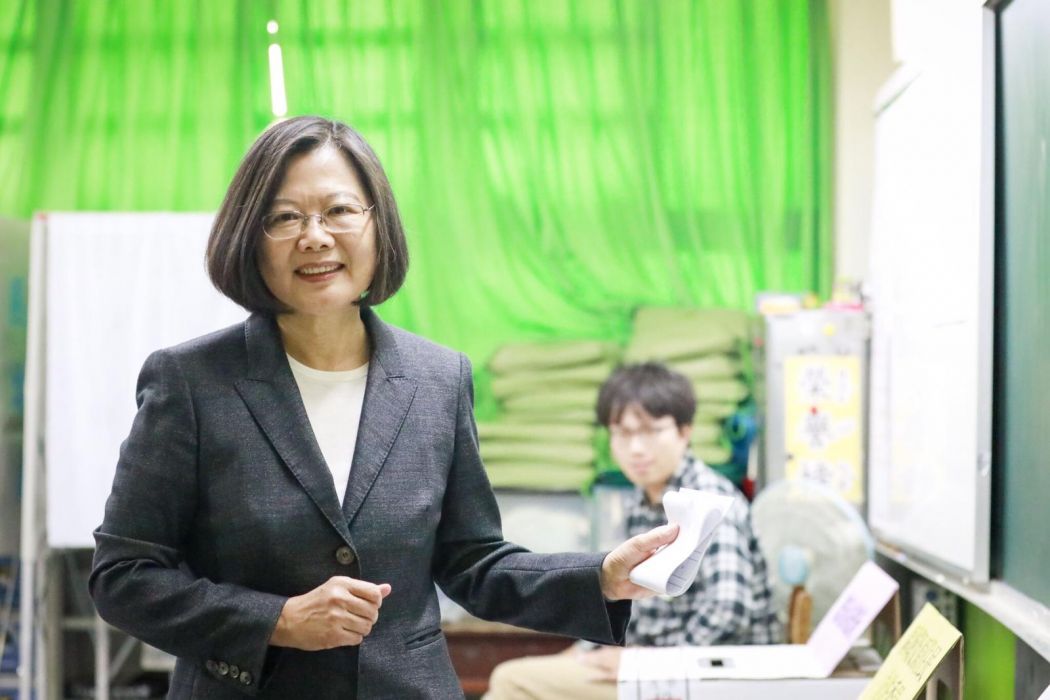Millions of Hongkongers took great vicarious pleasure in the recent landslide re-election victory of Taiwanese President Tsai Ing-Wen. Tsai’s triumph of garnering a record 8.2 million votes (58 per cent of the total turnout) was, in a very real sense, a triumph for Hong Kong as well.
Indeed, although such recognition will never be publicly expressed, in her heart of hearts Tsai, who represents the independence-leaning Democratic Progressive Party (DPP), must be offering a profuse “thank you” to the anti-government protesters who have turned Hong Kong into a battle zone over the last seventh months.

Hong Kong protesters’ ongoing campaign has served to shine an international spotlight on Beijing’s betrayal of the “One Country, Two Systems” blueprint. This was supposed to guarantee Hong Kong’s core freedoms and autonomy for 50 years and the Chinese leadership continues to peddle it, with zero success, to Taiwan.
Tsai may also be silently thanking the Hong Kong Police Force for their transformation during these protests from “Asia’s finest” to paramilitary gendarmes of abuse. One of her most effective campaign slogans was “Hong Kong today, Taiwan tomorrow,” and the Hong Kong police certainly did their part to conjure up this nightmare scenario for the nearly 24 million people who live on the self-governing island.
Beijing regards Taiwan, where Chiang Kai-shek and the remnants of his Nationalist government took refuge in 1950 after their defeat by Mao Zedong’s Communists in the Chinese Civil War, as a wayward province that must eventually be reunited with the motherland. But Taiwanese voters are having none of that, and Hong Kong’s continuing plight is a big reason why.
Now that the election is over and Tsai’s position is secure, however, don’t expect to hear much more from her or her government about Hong Kong. We were an exceptionally useful backdrop for her campaign against Han Kuo-yu, who became the Beijing-friendly Kuomintang’s most popular politician after his election in 2018 as mayor of Kaohsiung, traditionally a DPP stronghold.

Hong Kong’s usefulness has expired. Riding the wave of an overwhelming electoral blowout, there is no need for Tsai to antagonise Beijing further with more inflammatory rhetoric about Hong Kong. Time to pull back and maintain the ambiguous and uneasy truce that is Taiwan’s best chance of carrying on as a self-ruled entity. It has not been recognised as a country by the United Nations since 1971, when Chiang’s Republic of China was finally unseated by Mao’s People’s Republic of China.
True, a statement Tsai made this week to the BBC may have seemed an in-your-face provocation to Chinese President Xi Jinping, who has clearly and repeatedly expressed abhorrence for any talk of independence. “We don’t have a need to declare ourselves an independent state,” Tsai told the British broadcaster. “We are an independent country already and we call ourselves the Republic of China, Taiwan.”
A brash, bold, gutsy thing to say, but for most analysts, the first line of Tsai’s statement is far more important than the point that follows.
The truth is that, despite Tsai’s runaway victory last week, Taiwan remains in a very weak position vis-à-vis the mainland, and Hong Kong’s position is many times weaker.
Tsai may reject the one-China principle and “lean” toward independence, but this anti-Beijing icon will never actually risk a People’s Liberation Army cross-strait invasion by making a formal declaration of independence because she knows this would cross the Chinese leadership’s red line.
That same red line has been drawn – and crossed – in Hong Kong, with those advocating independence, or its equally taboo cousin, self-determination, banned from running for political office.

The big difference, of course, is that Hong Kong is already part of China as of the 1997 handover following 154 years of British colonial rule; at this point, Taiwan remains only a future prospect for reunification, and that prospect is a problem that got a lot bigger with Tsai’s re-election last week.
Hong Kong is a done deal, and Taiwan is a deal that doesn’t want to be done.
Meanwhile, both of these geographically diminutive locations find themselves caught up in the far greater geopolitical conflict between China and the United States, currently manifested by a Sino-US trade war in which both Taiwan and Hong Kong are mere pawns in the grand scheme of things.
Under the “Make America Great Again” presidency of Donald Trump, the US will support Hong Kong’s anti-Beijing protests and Taipei’s anti-Beijing government only so long as it serves its interests in the trade war – still burning bright in the wake of the feeble “phase one” agreement signed this week – and also aligns with its broader geopolitical goals.
In the final analysis, however, neither the US nor any other self-professed freedom-loving democratic Western government is going to jettison its relationship with China, a rising superpower, over little Hong Kong or Taiwan, both of which, sadly, are and will remain lonely, vulnerable afterthoughts in a world where far larger global forces compete to determine their fate.
